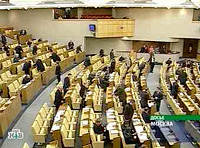Russia considers opportunity to set up two-party political system
A well-organized civil society has not been formed in Russia yet

Aklexander Veshnyakov, the chairman of the Russian Electoral Committee, harshly expressed his disagreement with the artificial establishment of the two-party system in Russia. “All ways that lead to the artificial creation of this system are very dangerous,” Veshnyakov told reporters yesterday. According to the official, the two-party system should be created naturally, without any barriers.
Veshnyakov also stated that the two-party system could be set up at forthcoming elections to the Russian parliament, if the authorities raised the passing score to 10-15 percent. In this case, however, the representative character of the State Duma will be broken: 49 percent of votes will not be counted. Alexander Veshnyakov added that it might push political parties towards extremist actions instead of a normal political struggle.
Veshnyakov said that the introduction of the 10-15percent passing score is “absolutely unacceptable.” Political guarantees, Veshnyakov said, are needed to have basic forces represented in the parliament. “If there are no basic forces in the Duma, we might give an incentive to extremist sentiments,” the head of the Central Electoral Committee said.
The idea to establish the two-party system in Russia sprang from Kremlin analysts prior to parliamentary election in 1995. Two political blocs would be dominating in the Duma, and they were expected to obtain the majority of votes. It is believed that the prototype of the Russian two-party system – the idea of the center-leftist and center-rightist blocs – was suggested by spin doctor Vyacheslav Nikonov, a person from the circle of Kremlin analysts.
The Kremlin liked the idea: two blocs were formed - Our Home - Russia (the right bloc) and Ivan Ribkin's Bloc (the left bloc). The idea went into the wastebasket afterwards: Ribkin's bloc failed to win votes from the communist party, and Our Home-Russia took the humble third place.
Nobody was dealing with the project of the two-party system in 1999, the government was too busy struggling for power. Six parties were left in the Duma after the elections of 1999.
The system was being built gradually. In the spring of 2000 Boris Gryzlov announced the need to set up the two-party system. The passing score to the Duma was raised from five to seven percent. After that law-makers approved the law about political parties, which said that a party should have the maximum of 10,000 members. In addition, a party must have its divisions in more than a half of Russian regions. President Putin dotted all “i's” when he raised the issue of the political organization in Russia in May of the current year. Putin approved the government's choice, which decided to enlarge political parties. Putin promised to support small political associations, but it seemed that they would not have access to the parliament: “The Justice Ministry has 46 parties registered. This number is enough to let voters make their choice,” Putin said.
One may come to conclusion that there will be no new parties registered. The Justice Ministry will perceive the president's wish as a regulation.
Political systems in Western societies have been exercising their stability for hundreds of years, although they have changes happening there too. The two-party system is practiced in certain countries; public associations cooperating with parties started playing an important role in other states.
The experience of Japan and Sweden proves the efficiency of the multi-party system with a dominating bloc. The Netherlands, Denmark, Belgium and Austria are used to having many parties without any special domination. The two-party model of political organization in the USA, Australia and Canada does not deprive people of an opportunity to choose.
A well-organized civil society has not been formed in Russia yet. The political structuring still continues in a rather chaotic way.
According to latest opinion polls conducted in Russia, the Russian population is not very active from the political point of view. Russians demonstrate their social activity after an act of terrorism, for example, when they make money transferences to those, who need financial help. However, only two or four percent of Russians are attracted to becoming members of parties, trade unions, or public and religious organizations. Thirty-two percent of respondents said they had never done anything similar.
The Russian people are busy with their own problems (44%), and they are certain that their public activity will not bring any results and will not help them solve their problems (43%). Twenty-seven percent believe that Russians do not have mutual understanding for one another. Eight percent said that there was no infrastructure in the country, which would be needed to conduct such civil activities.
Subscribe to Pravda.Ru Telegram channel, Facebook, RSS!


